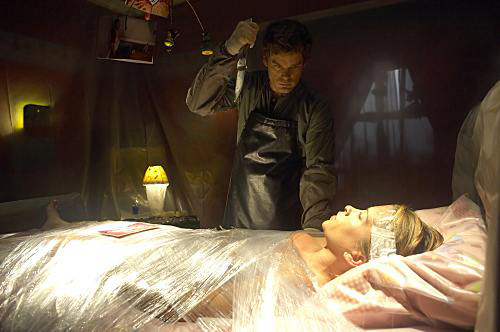I recently got into a conversation with someone about the show Dexter. The gentleman I was talking with is a fan of the show and reacted intensely to my criticism of the show. I should explain the context for this discussion: we were in a fellowship of Christians who work in the entertainment business. So, there was an expectation of agreement on certain standards of judgment. But what happened in the conversation ran counter to that.

My criticism of Dexter is grounded on the nature of the series premise. Everything else about the show grows from the premise. This is, actually, the essence of formal logic: the truth or validity of the whole logical argument depends entirely on the validity of the elements of the premise. If any of the elements of the premise are false, in logic, the rest of the argument cannot be valid. It’s a matter of equations: one false note contaminates the whole.
So, with that in mind, back to the discussion of Dexter.
My friend protested my criticism of Dexter [which I’ve written about HERE] on the grounds that I have not watched the show regularly. The fact that I was focusing on the nature of the premise itself didn’t seem to register as significant, at least with him.
He felt that there were justifications for a series about a psychopathic serial killer, who supposedly only kills those who “deserve it.” He said such a series could show the audience what the “bad side” is like — all the precautions that Dexter (who works for the police as a forensic blood spatter expert) has to take to prevent his own capture. A second reason he put forward is “just to entertain.”
So the question then becomes, “What is entertainment?”

We seek entertainment, particularly in stories, as a way of reflecting upon our human nature. Each creator, whether writer, visual artist, or musician, can show us something fresh about the experience of being human. We like encountering stories that take us into new human territory.
So that brings us back to Dexter: what do we get from an on-going series about a serial killer?
Well, someone could point to stories with Tragic Heroes: heroes who have made wrong choices and thus have their lives collapse around them. Oedipus is the classic example of such a hero: he kills a man in a fit of anger, not knowing it was his own father, and then marries the widow, having children with his own mother. But is Dexter like that? No, we’re told that he was apparently born psychopathic, so this isn’t a case of an otherwise good man who has made dire mistakes unknowingly.
What about Anti-Heroes, then? An Anti-Hero openly sets himself against socialization, he isolates himself from the social norm. The very nature of his alienation from standard human behavior fascinates us, when we encoutner it in stories. When we encounter it in real life, well, so long as the person doesn’t break the law, we tend to leave them alone. But is this Dexter? No. He supposedly engages in society in normal fashion, actually working among normal people and making attempts at “normal” relationships.
So what is this?
We are presented with a series wherein the main character regularly commits murder. In spite of the fact that the premise of the series says that all the victims deserve to die, we are still obliged to invest in the success of a serial killer. Week after week, the audience invests in the expectation that Dexter will find his victim, kill his victim, and not get caught. Dexter is an unsupervised judge, jury, and executioner.
He is a psychopath.

In the conversation with my friend, he offered as a palative quality that Dexter has struggles with his nature, that he knows his choices are wrong, but by sticking to his “Code,” that somehow redeems his actions. Or, secondarily, that Dexter likes children and is concerned that his own son not grow up to be a creature like himself.
And here begins the problem. The presentation of the character of Dexter is a lie about the nature of what it means to be a psychopath.
Psychopaths don’t care about others. They are disconnected from other human beings. They may be aware of the norms of human nature, they may even comply with many of the laws, but they don’t really care about them. And certainly, they labor to avoid punishment for any infraction of the social norms. But they have no emotions for others.
A psychopath is not going to care about justice for others. A psychopath is a completely self-centered personality. A psychopath may indeed like children, but they do so because the children are regarded as possessions over which the psychopath has control. Children are favored so long as they are controlable. What the child might become is irrelevant to the psychopath.
That is the truth of the human nature of a psychopath.
The truth about ordinary humans is that acts such as those that Dexter commits create great disturbances in the human psyche. If the person continues to murder, who the target is becomes less and less important. Such a person, no matter the cause they start with, if he or she continues to kill becomes desensitized to the effect on the victim. This is, in fact, a danger that combat soldiers have to deal with. So Dexter, with his “struggles” about his killings, does not ring true on either the personal emotive level or the consequences to himself.
My friend the Dexter fan contended that Dexter does feel remorse for his actions. But if this were genuine, the remorse combined with continued killing would make him crazy: he would either turn himself in or kill himself. That is human nature.

Basically, Dexter is a show that does not tell us anything true about human nature.
So what makes it compell an audience to return?
Good writing (as in well-crafted writing), high production values, and excellent acting performances.
But there is another factor. I call it emotional pornography.
Pornography is a type of “entertainment” that presents us with unrealistic standards and situations. Sexual pornogrphy focuses both on unrealistic representations of physical beauty (male and female) and unrealistic presentations of intimate interactions: physical pleasure only, disconnected from our emotional engagement with others. Emotional pornography does the same thing: it allows us to indulge in a fantasy of action without realistic conseequences. In this case, a character repeatedly murders others without it having a genuine effect on his psyche (or on his continued ability to evade capture by law enforcement)
In Dexter this type of storytelling invites the audience to identify with a character who slaughters without genuine remorse and who can successfully defy the guardians of our social standards.
I call that rather sinister storytelling. The storytellers have lied about human nature so well that the audience is sucked in, and finds ways to justify their continued adherence to the story. The explanations for why they call it “good” become complicated and entangled. They can’t really say they like the character and want to be like him, nor can they say they are fascinated by watching someone struggle with the consequences of his actions (which is where Tony Soprano would fit in on the scale — a man who is certainly suffering – to a degree – as a consequence of his actions). Nobody wants to say flat out: “Dexter gets to do evil and get away with it, and I get a kick out of watching that.”
But that is what is really happening with the audience of the show.
